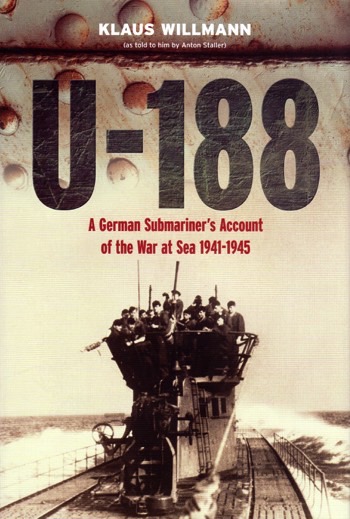
U-188: A German Submariner’s Account of the War at Sea 1941-1945. As told to Klaus Willmann by Anton Staller. English translation by Geoffrey Brooks. Pen and Sword / Frontline Books, Barnsley, 2015. ISBN 978-1-84832-760-3, 196 pages.
Reviewed by Dr Gregory P. Gilbert.
NOT quite 75 per cent of all German submariners serving in World War II, some 28,000 men, lost their lives. In addition, another 5000, or 12.5 per cent, became prisoners of war. In human terms it is hard to imagine how one could continue to fight in severe conditions where the likelihood of death was constant. Of course there is no option of an individual running away from the front lines or surrendering when they are on a naval vessel at sea. The only way for a modern reader to try and understand how a German submariner lived in the extraordinary circumstances of WWII and how average human beings are able to overcome great obstacles is through the recorded memory of a survivor.
U-188: A German Submariner’s Account presents the memoir of Anton (Toni) Staller as told to the book’s author Klaus Willmann. Born in a small village near Munich in Bavaria the 18 year old Toni volunteered for the submarine service in the Kriegsmarine to avoid being just another conscripted German solder. From 28 September 1941 until the end of the war in April 1945, Toni trained for, served in and fought in the U-boats. His was a remarkable and lucky career. After basic submarine training he joined the crew of U-188 ,which was working-up in the Baltic, as a seaman lookout on the submarine’s ‘winter garden’.
In early 1943 U-188 was deployed on its first cruise in the North Atlantic. Under constant threat the boat managed to survive its episode in the Battle of the Atlantic although it was a close run thing. If the boat had sortied only a few months later its chances of survival in the Atlantic would have been greatly reduced. They reached Lorient in occupied France and following extensive repairs U-188 was sent to the Indian Ocean, to the Japanese occupied port of Penang in Malaya. A chart showing the cruise of the U-188 from France to Penang and back, between June 1943 and June 1944, is included within this book.
It was fortunate that the U-188’s War Diary was captured by the Royal Navy from one of the submarine’s boats and subsequently an intelligence report prepared on the subject. This source complements the memories of our informant Toni Staller. Once again back in France Toni describes how the Kriegsmarine organisation effectively collapsed and how the Navy crews made their way back to their bases in Northern Germany. Here their limited land warfare training kicked in and helped with their chances of survival.
For the next ten months Toni Staller was a submariner without a boat however the collapse of the German frontiers in early 1945 meant he was attached to an elderly recommissioned training boat in order to conduct a suicide mission in the North Sea. He was fortunate that circumstances, and perhaps action by a number of the crew, meant that this planned mission never took place. Following the surrender he was a prisoner of the British until released but even then the numerous difficulties of post-war Germany were always a concern.
Anton Staller led a remarkable and unusual life. He was a regular man who was also a brave and well-trained submariner. He was also a Nazi, although the extent of his support with the worst actions of the Nazi regime will probably never be known. He was most likely a submariner first and a Nazi second. His memoirs offer an interesting view of what it was like to serve as a sailor in the Kriegsmarine’s submarine force.
One might hope that such experiences of high intensity naval war are a thing of the past, however I would suggest only the technology has changed and in future wars sailors and submariners will need a willingness to continue to fight at sea no matter the risks involved and in necessity to lay down their life in defence of their family, friends and way of life. If so, it is an open question whether modern generations will volunteer to serve or not bother.



